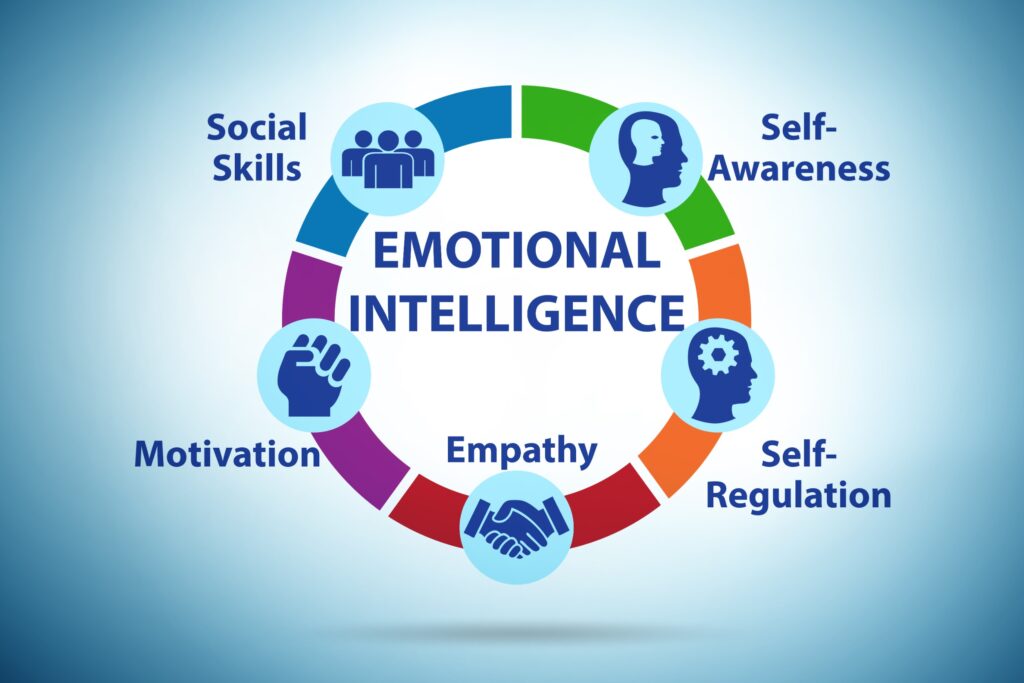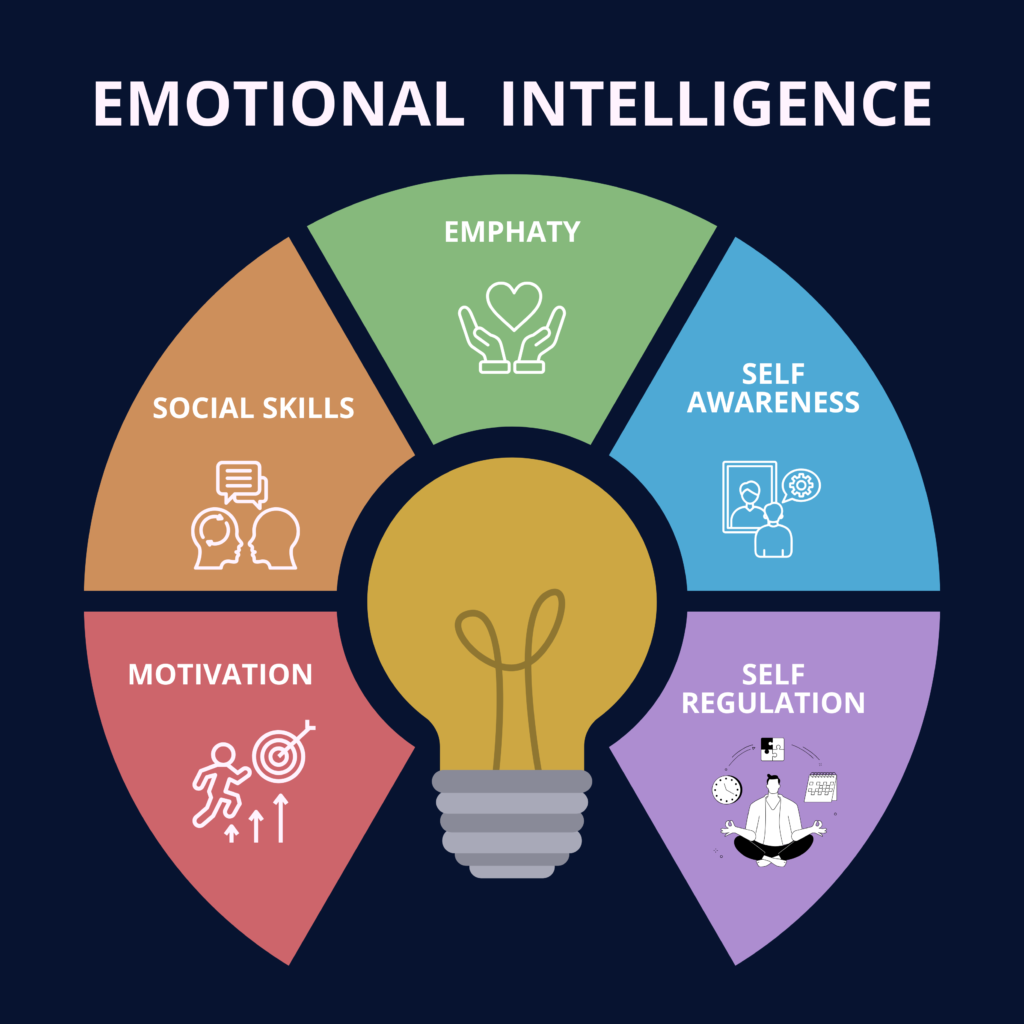Emotionally Intelligence: Future of leadership is being reshaped right before our eyes. In an era defined by rapid change, hybrid workplaces, cultural diversity, and constant pressure for innovation, organizations need leaders who can do more than just manage tasks—they need leaders who can deeply connect with people. The leaders who will thrive in the years ahead are not necessarily those with the highest IQ, but those with strong emotional intelligence (EQ) are emotionally intelligent
Being emotionally intelligent means understanding and managing your own emotions while also recognizing and influencing the emotions of others. In leadership, this skill is no longer optional—it is essential. Research consistently shows that emotionally intelligent leaders build stronger relationships, foster engagement, and create resilient, motivated teams.
In this article, we’ll explore why the future of leadership belongs to the emotionally intelligent and share 8 EQ strategies you can use to inspire your team, boost morale, and achieve sustainable success.

Why the Future of Leadership Belongs to the Emotionally Intelligent
The business landscape is evolving at lightning speed. Traditional command-and-control leadership styles are losing relevance as organizations place greater emphasis on collaboration, adaptability, and inclusion. Here are three reasons emotionally intelligent leadership is the way forward:
1. The Workplace is Becoming More Human-Centered
Employees today don’t just want a paycheck; they want meaning, purpose, and leaders who genuinely care. Emotionally intelligent leaders are better equipped to meet these needs by listening, empathizing, and creating environments where people feel valued.
2. Change and Uncertainty Demand Resilience
From technological disruption to economic fluctuations, leaders face constant challenges. Those with high EQ can remain calm under pressure, manage stress effectively, and help their teams navigate uncertainty with confidence.
3. Collaboration Drives Innovation
The future of leadership is lean, cross-functional, and global. Emotional intelligence allows leaders to build trust across diverse teams, resolve conflicts constructively, and spark creativity by embracing multiple perspectives.
In short, the future belongs to leaders who can inspire trust, foster belonging, and lead with empathy. Now, let’s look at the 8 EQ strategies to motivate and inspire your team.
Understanding Emotional Intelligence: The Foundation
Before we jump into strategies, let’s break down what EQ really means. At its core, emotional intelligence involves four pillars: self-awareness, self-management, social awareness, and relationship management. These aren’t fluffy concepts; they’re practical tools for everyday leadership.
- Self-Awareness: Knowing your emotions and how they affect your decisions.
- Self-Management: Controlling impulses and adapting to change.
- Social Awareness: Picking up on others’ emotions and understanding group dynamics.
- Relationship Management: Building bonds, resolving conflicts, and inspiring others.
Leaders who master these create ripple effects. For instance, a manager who senses team burnout can address it proactively, preventing dips in morale. In the future of leadership, where hybrid work blurs boundaries, EQ helps bridge gaps and keep everyone aligned.
Now, let’s get to the heart of it: eight EQ strategies tailored to motivate and inspire your team. Each one is actionable, with tips and real-world examples to make implementation straightforward.

8 EQ Strategies to Motivate and Inspire Your Team
These strategies draw from core EQ principles but are designed for immediate use. Incorporate them into your routine, and watch your team’s engagement soar.
Strategy 1: Cultivate Self-Awareness to Lead Authentically
Self-awareness is the bedrock of being emotionally intelligent. It starts with honest reflection: What are your strengths, triggers, and biases? Leaders who know themselves can lead without ego getting in the way.
- Actionable Tip: Keep a daily journal. Note one emotional high and low from your day, and how it influenced your interactions.
- Example: Imagine a project deadline stressing you out. Instead of snapping at your team, acknowledge your anxiety and communicate calmly. This authenticity builds trust and motivates others to open up.
By modeling vulnerability, you inspire your team to do the same, fostering a culture of genuine motivation.
Strategy 2: Practice Active Listening for Deeper Connections
Emotionally intelligent leaders don’t just hear—they listen. Active listening shows you value input, which is crucial for inspiration.
- Actionable Tip: In meetings, paraphrase what someone says: “What I’m hearing is you’re concerned about the timeline—am I right?”
- Example: A team member shares frustration over workload. By listening without interrupting, you uncover the root issue (like unclear priorities) and address it, boosting their motivation.
This strategy turns potential conflicts into opportunities for growth, key in the future of leadership.
Strategy 3: Show Empathy to Build Emotional Bonds
Empathy isn’t sympathy; it’s understanding others’ perspectives. It’s a superpower for motivating diverse teams.
- Actionable Tip: Use “empathy mapping.” Ask yourself: What is this person feeling? Thinking? Saying? Doing?
- Example: If an employee is underperforming due to personal issues, empathize by saying, “I can see this is tough for you—how can I support?” This inspires loyalty and higher performance.
In a world of remote work, empathy bridges emotional distances, making it indispensable for emotionally intelligent leaders.
Strategy 4: Manage Your Emotions to Stay Composed Under Pressure
Self-regulation prevents emotional hijacks. Leaders who stay calm inspire confidence, especially during crises.
- Actionable Tip: Try the “pause and breathe” technique: Before reacting, take three deep breaths and assess the situation.
- Example: During a heated team debate, instead of escalating, regulate by saying, “Let’s take a step back and find common ground.” This models resilience, motivating your team to handle stress better.
Mastering this is how to improve emotional intelligence over time—practice turns it into habit.
Strategy 5: Foster Positive Relationships Through Open Communication
Strong social skills mean building networks based on trust. Emotionally intelligent leaders communicate transparently to inspire collaboration.
- Actionable Tip: Schedule regular one-on-ones focused on non-work topics to build rapport.
- Example: Share your own challenges in team huddles, like “I struggled with this last quarter, but here’s how we overcame it.” This vulnerability encourages team input and innovation.
In the future of leadership, relationships will be the currency of success.
Strategy 6: Inspire Intrinsic Motivation by Aligning with Values
High-EQ leaders tap into what drives people beyond paychecks—purpose and growth.
- Actionable Tip: During goal-setting, ask: “What excites you about this project?” Tie tasks to personal values.
- Example: If a team member values creativity, assign them innovative tasks. This sparks intrinsic motivation, leading to inspired performance.
Emotionally intelligent motivation isn’t about carrots and sticks; it’s about meaningful connections.
Strategy 7: Deliver Constructive Feedback with Care
Feedback can demotivate if mishandled, but EQ turns it into a tool for inspiration.
- Actionable Tip: Use the “SBI model”: Situation, Behavior, Impact. “In yesterday’s meeting (situation), you interrupted others (behavior), which made the discussion less collaborative (impact).”
- Example: Follow up with positives and growth opportunities, like “Your ideas are spot-on—let’s work on timing.” This builds confidence and motivates improvement.
This strategy is a direct way to improve emotional intelligence in your team dynamics.
Strategy 8: Create a Supportive Environment for Collective Success
Finally, emotionally intelligent leaders cultivate positivity, where everyone thrives.
- Actionable Tip: Celebrate small wins publicly and encourage peer recognition.
- Example: Implement a “kudos board” for shoutouts. When a team hits a milestone, highlight contributions, inspiring ongoing effort.
A positive vibe reduces burnout and fosters inspiration, positioning you as a leader for the future.
READ MORE : What are the 8 Essential Steps To Validate Your Startup Ideas?
How to Improve Emotional Intelligence: Practical Steps for Long-Term Growth
Now that you’ve got the strategies, let’s talk about building EQ sustainably. Improving emotional intelligence isn’t a one-off; it’s a journey. Start with self-assessment tools like the Emotional Intelligence Appraisal or free online quizzes. Seek feedback from peers—ask, “How do I handle stress in meetings?”
Incorporate mindfulness practices, such as meditation apps like Headspace, to enhance self-awareness. Read books like Goleman’s “Emotional Intelligence” for deeper insights. Join workshops or coaching sessions focused on EQ development. Remember, consistency is key—track your progress monthly.
For leaders, mentoring others in EQ amplifies your impact. Share these strategies in team trainings, and you’ll see collective growth. In the future of leadership, those who prioritize EQ training will lead the most resilient teams.
Wrapping It Up: Step Into the Future of Leadership Today
The future of leadership belongs to the emotionally intelligent because EQ turns managers into motivators, conflicts into collaborations, and teams into powerhouses. We’ve explored why EQ is essential, broken down its foundations, and armed you with eight strategies to motivate and inspire. From self-awareness to creating positive environments, these aren’t just tips—they’re game-changers.
Ready to elevate your leadership? Start with one strategy this week. Journal your self-awareness, practice active listening in your next meeting, or show empathy in a tough conversation. Track the changes in your team’s energy and productivity. If you’re hungry for more, subscribe to our blog for weekly leadership insights, or drop a comment below: What’s your biggest EQ challenge? Let’s build the future of leadership together—one emotionally intelligent step at a time.





